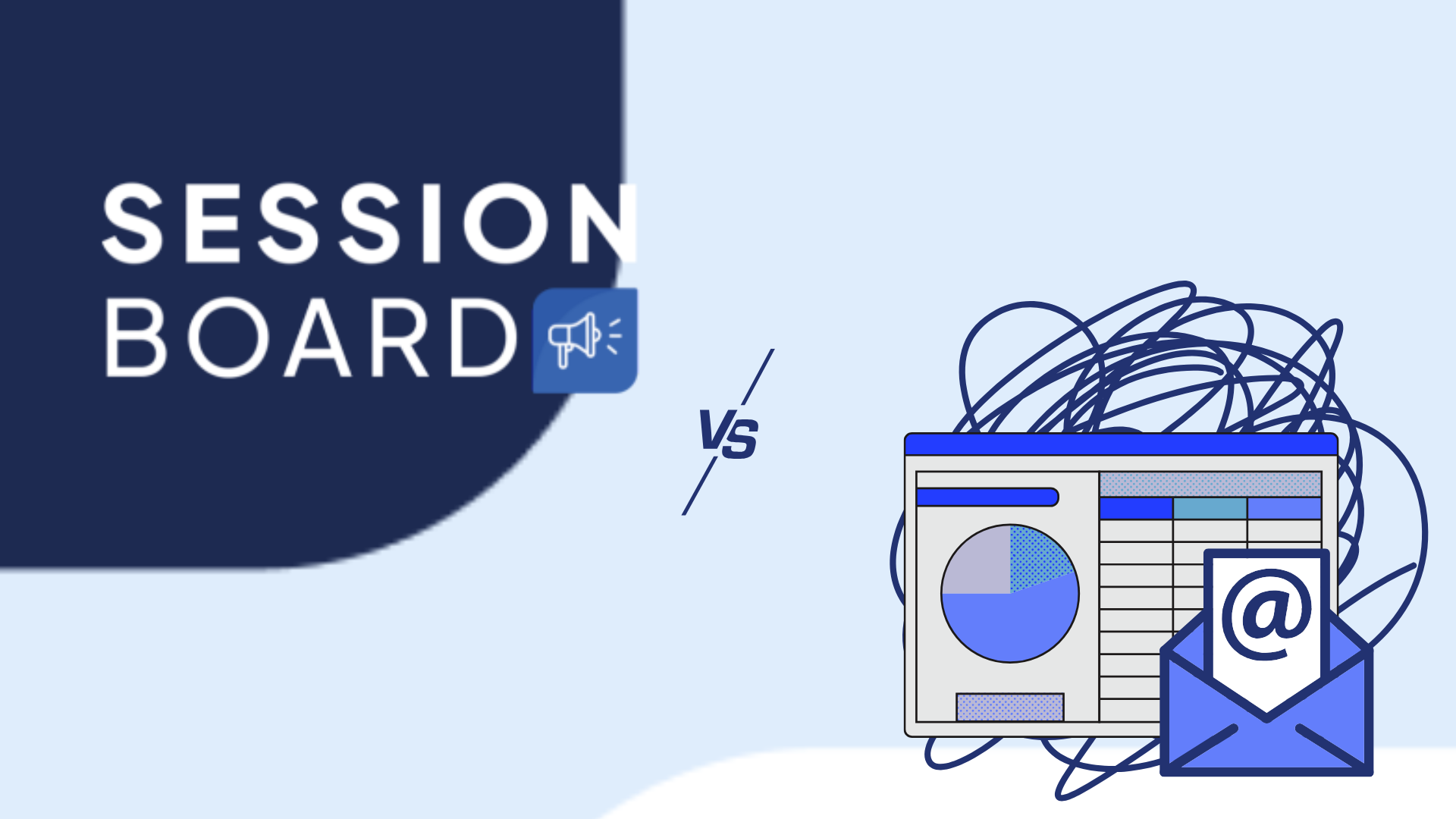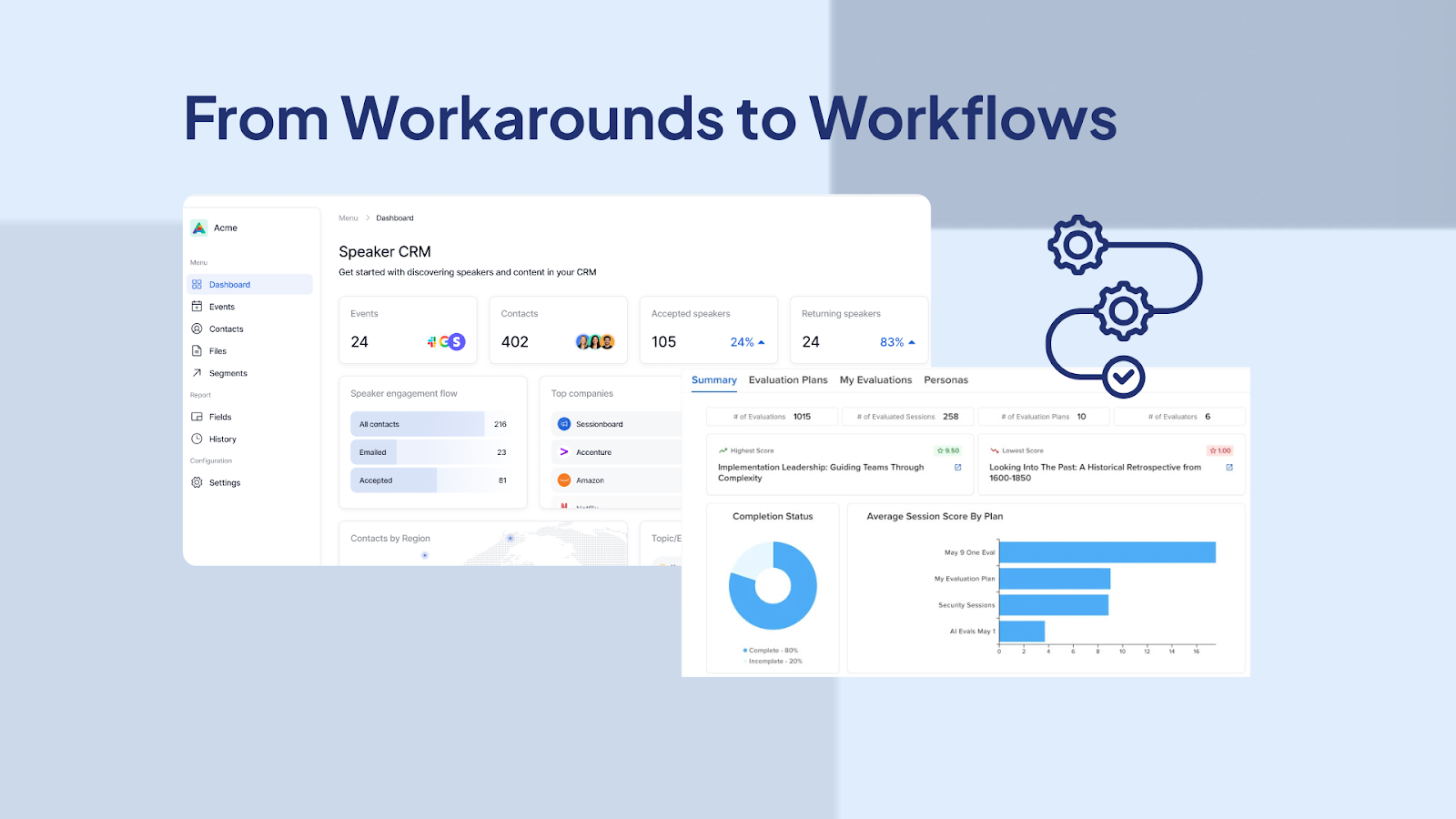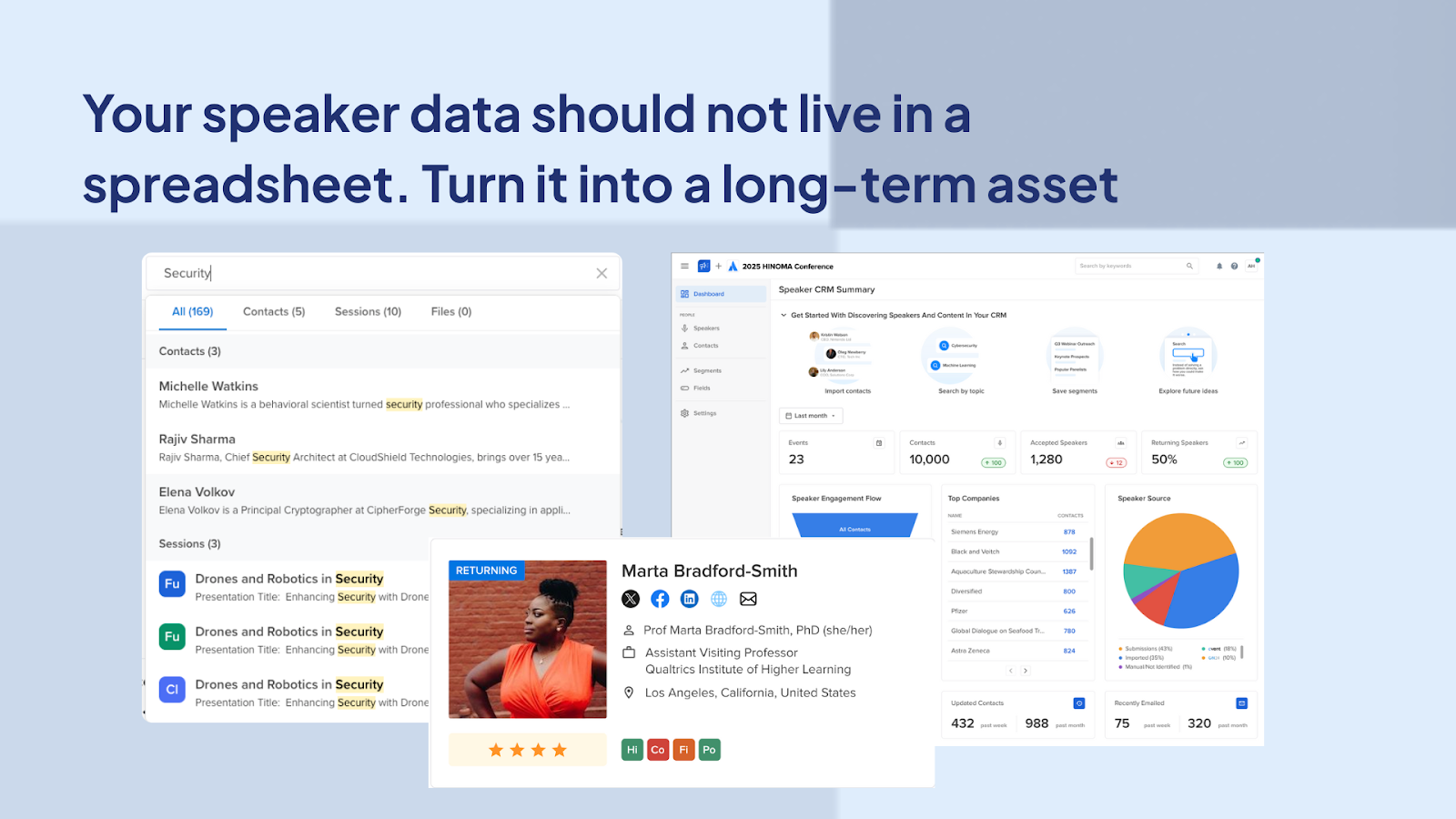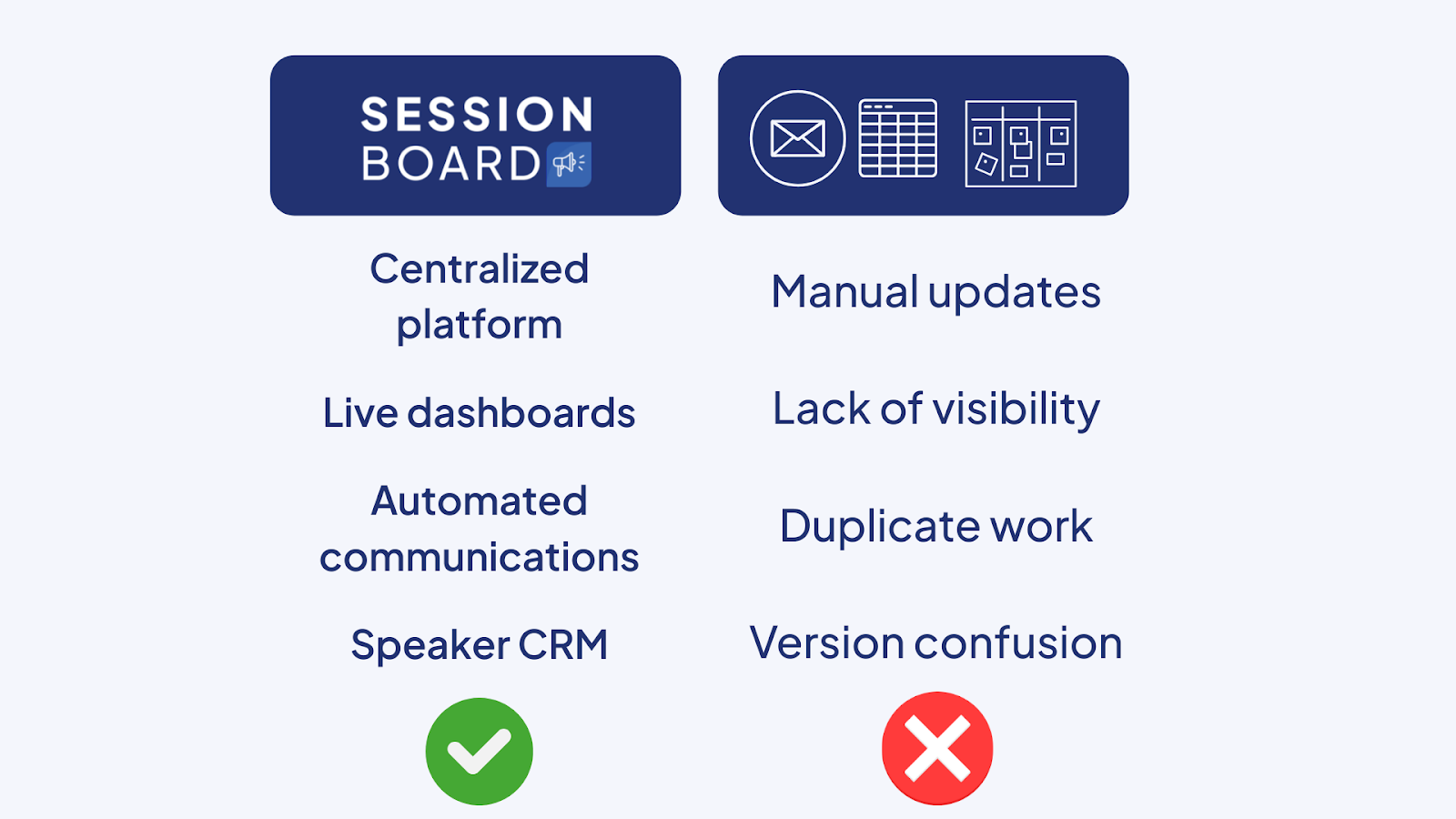Sessionboard vs. Spreadsheets, Emails, and Other Workarounds:
The Problem with Spreadsheets and Emails

.png)

Spreadsheets and email were never designed to run events. They are flexible enough to get you started, but they fall apart the moment you need structure and visibility.
Every event marketer has felt this. You open the speaker spreadsheet and see two different tabs labeled “Final.” You dig through your inbox for the latest session description because the one in the sheet still says “TBD.” You ask a teammate if they already followed up with a speaker, only to find out they sent an email but forgot to CC the rest of the team.
Here is the problem. None of these tools talk to each other. Your submissions are in one place. Your agenda lives somewhere else. Your communication is buried in individual inboxes. And because everything is disconnected, you end up doing the same work twice, just to make sure nothing slips through the cracks.
This is more than inefficient. It has a real cost. When your team is buried in version control, manual reminders, and last-minute edits, you are not improving your agenda or elevating your content. You are just surviving the process.
This is why event teams need something different. A single platform that does not just track information but connects it. Tools like Sessionboard’s Speaker Portals, AI Evaluations, and Studio Remix exist because event teams deserve more than an endless loop of spreadsheets and email threads. They deserve a workflow that scales.
Event planning should not feel like a scramble. Teams need a single place to collect, review, and manage content that does not break the moment the event scales. That means more than a better spreadsheet. It means a connected platform that was built for the way event content actually works.
With Sessionboard, you can start with your call for papers and never lose context. Submissions, speaker bios, abstracts, and evaluations all live in one workflow. Reviewers can use AI Evaluations to process hundreds of submissions in minutes with structured feedback, while still having the final say. Once your sessions are selected, they move seamlessly into the agenda builder, where your team can schedule, manage conflicts, and notify speakers instantly.
And it is not just about logistics. Sessionboard’s Speaker CRM turns every event into a growing database of subject matter experts. Instead of digging through past event folders, you can search by topic, filter by past participation, and instantly find the right speaker for your next webinar or panel. This is not just planning your next event. This is building a long-term content engine.
Pair that with integrations for tools like ON24, Cvent, and Swapcard, and your data flows where it needs to go without exports, imports, or endless copy-paste. Your content is no longer trapped in separate systems. It becomes something your whole team can find, use, and reuse.
When you have this kind of structure, you do not just save time. You give your team the space to think bigger. You move from fighting fires to refining strategy. You stop managing content and start leveraging it.

The shift from spreadsheets and scattered emails to a single, purpose-built platform is not just about convenience. It is about replacing a messy, reactive process with one that is predictable, scalable, and built for how event teams actually work.
Sessionboard brings every part of the workflow into one place. Submissions, evaluations, agenda management, and speaker communications live in a connected system where nothing slips through the cracks. Instead of chasing details, you can see everything at a glance. Dashboards show which sessions are ready, which speakers still need to submit their bios, and which tasks are overdue. No digging, no second-guessing.
AI Evaluations make it possible to review hundreds of submissions quickly and consistently. They do not replace the expertise of your team. They help you get through the heavy lifting so you can focus on the sessions that really matter.
Once sessions are selected, Studio Remix takes over. It allows you to polish bios, edit session titles and descriptions, generate relevant tags, and even set tone and character limits for your event content. It is like having an editorial safety net built right into your workflow. Combine this with Global Search, and your team can finally reuse content with confidence, whether it is pulling a bio for a future event or finding sessions that align with new campaigns.
All of this connects back to something bigger: building a system that does not just run your next event but strengthens every event after it. Your Speaker CRM grows with each program. Your content library becomes more useful over time. Your data flows between tools like ON24, Cvent, and Swapcard without friction.
This is what replacing chaos really looks like. Not just fewer spreadsheets, but a platform that helps you deliver better events and better content with less effort every single time.

When you replace spreadsheets and scattered emails with a connected workflow, the difference is immediate. It is not just about saving time, although teams consistently report gaining hours back for every event. It is about removing friction from the entire process so you can focus on what truly matters: building better content and stronger programs.
Speaker CRM turns every event into an investment that pays off long after it ends. As we explored in our blog on how speakers can power your full content strategy, every bio, abstract, and engagement record becomes part of a growing, searchable database. Instead of starting from scratch, you can source proven experts, build repeatable campaigns, and give your marketing team a content engine they can tap into year-round.
Dashboards give you control and visibility without the constant firefighting. You can see which sessions are ready, where reviews are lagging, and what still needs approval. As we covered in the Guru Media Hub case study, this level of insight was a game-changer for small teams running massive programs. It meant no last-minute surprises, no manual status checks, and no second-guessing.
AI Evaluations and Studio Remix remove the most painful manual tasks. You can process hundreds of submissions quickly, standardize speaker bios and session content, and deliver a polished program without hiring extra staff or spending late nights fixing formatting issues. These tools do not replace human judgment—they make it easier for event professionals to focus on the decisions that matter most.
And then there is Global Search. With it, your event history becomes an asset you can actually use. Need to find a cybersecurity session from last year for a blog series? Want to pull a speaker bio for a podcast guest pitch? It is all there in one place, connected and ready to go.
This is the real impact of Sessionboard. It is not a tool for managing the chaos—it is the system that replaces it with a smarter, faster, and more strategic way of working.

Managing speakers and content with spreadsheets and emails is not just slow—it limits what your team can accomplish. Sessionboard was built for event professionals who want a smarter way to plan, manage, and reuse their content without the manual busywork that holds teams back.
With connected tools for submissions, dashboards that give you instant visibility, and a Speaker CRM that helps you unlock long-term value, Sessionboard brings everything together in one platform. And we are not stopping there. Through our Voice of Customer portal, we are working side by side with event teams to build the features they need most, from AI-assisted content tools to new ways of turning event data into actionable insights.
If you are ready to leave spreadsheets and email chains behind, request a demo today. We will show you exactly how Sessionboard can simplify your workflow, scale your content strategy, and give your team the confidence to plan every event with less stress and more impact.
The Problem with Spreadsheets and Emails
Spreadsheets and email were never designed to run events. They are flexible enough to get you started, but they fall apart the moment you need structure and visibility.
Every event marketer has felt this. You open the speaker spreadsheet and see two different tabs labeled “Final.” You dig through your inbox for the latest session description because the one in the sheet still says “TBD.” You ask a teammate if they already followed up with a speaker, only to find out they sent an email but forgot to CC the rest of the team.
Here is the problem. None of these tools talk to each other. Your submissions are in one place. Your agenda lives somewhere else. Your communication is buried in individual inboxes. And because everything is disconnected, you end up doing the same work twice, just to make sure nothing slips through the cracks.
This is more than inefficient. It has a real cost. When your team is buried in version control, manual reminders, and last-minute edits, you are not improving your agenda or elevating your content. You are just surviving the process.
This is why event teams need something different. A single platform that does not just track information but connects it. Tools like Sessionboard’s Speaker Portals, AI Evaluations, and Studio Remix exist because event teams deserve more than an endless loop of spreadsheets and email threads. They deserve a workflow that scales.
Event planning should not feel like a scramble. Teams need a single place to collect, review, and manage content that does not break the moment the event scales. That means more than a better spreadsheet. It means a connected platform that was built for the way event content actually works.
With Sessionboard, you can start with your call for papers and never lose context. Submissions, speaker bios, abstracts, and evaluations all live in one workflow. Reviewers can use AI Evaluations to process hundreds of submissions in minutes with structured feedback, while still having the final say. Once your sessions are selected, they move seamlessly into the agenda builder, where your team can schedule, manage conflicts, and notify speakers instantly.
And it is not just about logistics. Sessionboard’s Speaker CRM turns every event into a growing database of subject matter experts. Instead of digging through past event folders, you can search by topic, filter by past participation, and instantly find the right speaker for your next webinar or panel. This is not just planning your next event. This is building a long-term content engine.
Pair that with integrations for tools like ON24, Cvent, and Swapcard, and your data flows where it needs to go without exports, imports, or endless copy-paste. Your content is no longer trapped in separate systems. It becomes something your whole team can find, use, and reuse.
When you have this kind of structure, you do not just save time. You give your team the space to think bigger. You move from fighting fires to refining strategy. You stop managing content and start leveraging it.

The shift from spreadsheets and scattered emails to a single, purpose-built platform is not just about convenience. It is about replacing a messy, reactive process with one that is predictable, scalable, and built for how event teams actually work.
Sessionboard brings every part of the workflow into one place. Submissions, evaluations, agenda management, and speaker communications live in a connected system where nothing slips through the cracks. Instead of chasing details, you can see everything at a glance. Dashboards show which sessions are ready, which speakers still need to submit their bios, and which tasks are overdue. No digging, no second-guessing.
AI Evaluations make it possible to review hundreds of submissions quickly and consistently. They do not replace the expertise of your team. They help you get through the heavy lifting so you can focus on the sessions that really matter.
Once sessions are selected, Studio Remix takes over. It allows you to polish bios, edit session titles and descriptions, generate relevant tags, and even set tone and character limits for your event content. It is like having an editorial safety net built right into your workflow. Combine this with Global Search, and your team can finally reuse content with confidence, whether it is pulling a bio for a future event or finding sessions that align with new campaigns.
All of this connects back to something bigger: building a system that does not just run your next event but strengthens every event after it. Your Speaker CRM grows with each program. Your content library becomes more useful over time. Your data flows between tools like ON24, Cvent, and Swapcard without friction.
This is what replacing chaos really looks like. Not just fewer spreadsheets, but a platform that helps you deliver better events and better content with less effort every single time.

When you replace spreadsheets and scattered emails with a connected workflow, the difference is immediate. It is not just about saving time, although teams consistently report gaining hours back for every event. It is about removing friction from the entire process so you can focus on what truly matters: building better content and stronger programs.
Speaker CRM turns every event into an investment that pays off long after it ends. As we explored in our blog on how speakers can power your full content strategy, every bio, abstract, and engagement record becomes part of a growing, searchable database. Instead of starting from scratch, you can source proven experts, build repeatable campaigns, and give your marketing team a content engine they can tap into year-round.
Dashboards give you control and visibility without the constant firefighting. You can see which sessions are ready, where reviews are lagging, and what still needs approval. As we covered in the Guru Media Hub case study, this level of insight was a game-changer for small teams running massive programs. It meant no last-minute surprises, no manual status checks, and no second-guessing.
AI Evaluations and Studio Remix remove the most painful manual tasks. You can process hundreds of submissions quickly, standardize speaker bios and session content, and deliver a polished program without hiring extra staff or spending late nights fixing formatting issues. These tools do not replace human judgment—they make it easier for event professionals to focus on the decisions that matter most.
And then there is Global Search. With it, your event history becomes an asset you can actually use. Need to find a cybersecurity session from last year for a blog series? Want to pull a speaker bio for a podcast guest pitch? It is all there in one place, connected and ready to go.
This is the real impact of Sessionboard. It is not a tool for managing the chaos—it is the system that replaces it with a smarter, faster, and more strategic way of working.

Managing speakers and content with spreadsheets and emails is not just slow—it limits what your team can accomplish. Sessionboard was built for event professionals who want a smarter way to plan, manage, and reuse their content without the manual busywork that holds teams back.
With connected tools for submissions, dashboards that give you instant visibility, and a Speaker CRM that helps you unlock long-term value, Sessionboard brings everything together in one platform. And we are not stopping there. Through our Voice of Customer portal, we are working side by side with event teams to build the features they need most, from AI-assisted content tools to new ways of turning event data into actionable insights.
If you are ready to leave spreadsheets and email chains behind, request a demo today. We will show you exactly how Sessionboard can simplify your workflow, scale your content strategy, and give your team the confidence to plan every event with less stress and more impact.

Stay up to date with our latest news
See how real teams simplify speaker management, scale content operations, and run smoother events with Sessionboard.